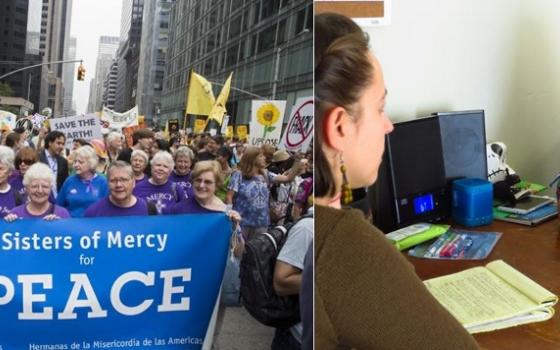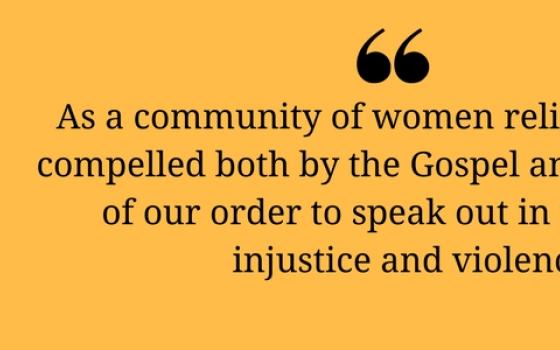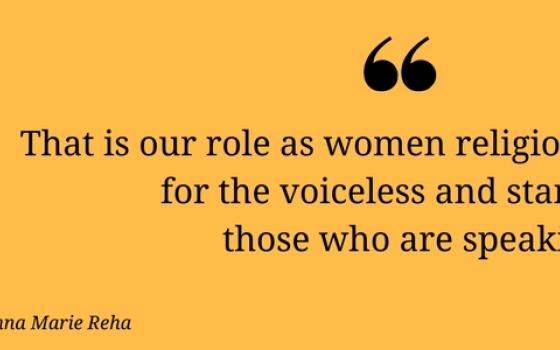The 2016 U.S. presidential election was called the most divisive presidential campaign in recent memory, and efforts to bridge the stark divide in American voters have had little or no effect.
Women religious — who are usually outside of political debates — have not been immune to Americans' rancor. Stances congregations have held for decades or even centuries have become controversial in some circles.
Members of the Communicators for Women Religious have said their communities have lost donors because they stand with immigrants, for example. Others said former supporters had become detractors.
"That shouldn't matter to anything we stand for," Erie, Pennsylvania, Benedictine Sr. Linda Romey said. "We cannot compromise our values so that we keep donors. It's our integrity we're talking about."
The situation is not new for the Erie Benedictines, she said.
"When the sisters began being more involved in issues locally, we lost donors," Romey said. "So we try to have conversations to try to explain, try to help them understand where we're coming from. If they can't, you say 'Sorry' and 'Maybe one day, you'll change your mind,' but it won't change our stand."
Explanations go a long way in smoothing relationships, she said.
"We need to say that if we're following the Gospel, it means this, this and this. But we don't always say why we do what we do," Romey said. "No matter the consequences, if we're going to follow Jesus, we have to act in this way. The people here in Erie know our stands and know we'll continue to advocate for the poor, take part in peace marches and vigils and stand on the side of immigrants, women and the environment."
One factor that may have complicated matters, she said, is that most members of congregations' communications staff are now laypeople. And though they are professionals and good at what they do, it can be harder for a layperson to explain the motives of a vowed religious person, Romey said.
Case in point: immigration
The Sisters of Mercy of the Americas are no strangers to the immigration debate: Members of the community arrived in the United States in 1843 as immigrants to minister to immigrants, despite facing anti-immigrant and anti-Catholic sentiment.
Recently, they ran a campaign of stories, photos and videos to mark National Migration Week, Jan. 7-13, which generated what some called "lively conversation" about immigrants.
Sr. Patricia McDermott, president of the Sisters of Mercy of the Americas, said controversy, criticism and even donations mean nothing compared to the Gospel.
"As a community of women religious, we are compelled both by the Gospel and the charism of our order to speak out in the face of injustice and violence," McDermott said. "The Sisters of Mercy were founded out of a deep concern for persons, especially women and children, who are poor and marginalized.
"Today, that commitment is focused on several areas of critical concern, including nonviolence, the eradication of racism, and just and humane treatment for migrants and refugees," she added. "We understand that people of good conscience will disagree with us sometimes, and we hope that disagreements will always be expressed with honesty and respect."
While sisters' stances may not have changed, the prominence of their voices has. As Donald Trump's campaign for president gathered steam and the support of white supremacists, renewed the debate over women's rights, and targeted immigrants, many congregations began issuing statements in response to the controversies. As sisters found their voices, they also found new critics.
Sr. Anna Marie Reha said her congregation, the School Sisters of Notre Dame, issued its first corporate stance in September, calling for comprehensive immigration reform.
"We tried to make the stance not about politics but about people," Reha said. "But there were one or two people not in agreement. ... I don't think the stance was a great surprise to our friends, family, supporters and collaborators."
The provincial council also issued a statement after the Oct. 1 mass shooting in Las Vegas that killed 58 people and injured more than 500. The move drew criticism from some who "felt we didn't understand gun control," she said.
All three congregations told Global Sisters Report that any loss of donations was minor and was made up for by new supporters drawn by the sisters' stances.
More importantly, Reha said, any debate gives an opportunity to engage in conversation and allow for education.
"As the School Sisters of Notre Dame, that's what we're about: education," she said. "It's also an opportunity to defuse anger instead of build on it and have constructive dialogue."
Supporters are grateful, Reha said, and that makes up for critics.
"They're happy we're taking these stances because often, we're the voice for those who feel they can't speak," she said. "That is our role as women religious: to be a voice for the voiceless and stand with those who are speaking."
[Dan Stockman is national correspondent for Global Sisters Report. His email address is dstockman@ncronline.org. Follow him on Twitter or on Facebook.]




